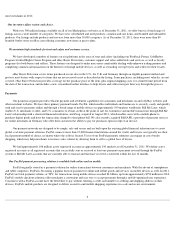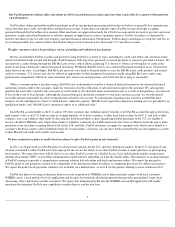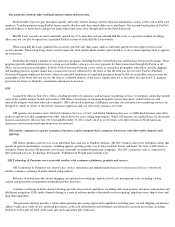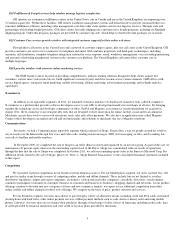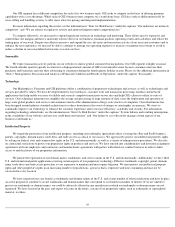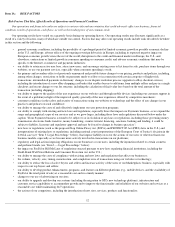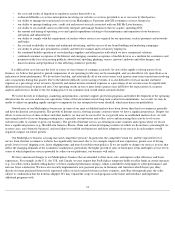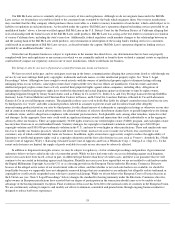eBay 2011 Annual Report Download - page 19
Download and view the complete annual report
Please find page 19 of the 2011 eBay annual report below. You can navigate through the pages in the report by either clicking on the pages listed below, or by using the keyword search tool below to find specific information within the annual report.
similar aims in different businesses and geographies. Some of the changes that we have announced to date have been controversial with, and led to
dissatisfaction among, our sellers, and additional changes that we announce in the future may also be negatively received by some of our sellers.
This may not only impact the supply of items listed on our websites, but because many sellers also buy from our sites, it may adversely impact
demand as well. Given the number of recent changes that we have made to our policies and pricing, it may take our sellers some time to fully
assess and adjust to these changes, and sellers may elect to reduce volume on our sites while making such assessments and adjustments or in
response to these changes. If any of these changes cause sellers to move their business (in whole or in part) away from our websites or otherwise
fail to improve gross merchandise volume or the number of successful listings, our operating results and profitability will be harmed.
We believe that the mix of sales under our traditional auction-style listing format and fixed-
price listing format will continue to shift towards
our fixed-price format. Accordingly, we have eliminated some of the features related to our traditional auction-style format and expect others will
continue to become less meaningful to, and used less frequently by, our sellers, resulting in a corresponding decrease in revenues from those
features. We also expect that the costs associated with our seller discount programs will increase as more sellers become eligible for such
discounts. In addition, because a large percentage of PayPal transactions originate on the eBay platform, declines in growth rates in major
Marketplaces markets also adversely affect PayPal's growth. The expected future growth of our PayPal, GSI, StubHub and our other lower margin
businesses may also cause downward pressure on our profit margins because those businesses have lower gross margins than our Marketplaces
platforms.
The sluggish economy could harm our business.
Our Marketplaces, Payments and GSI ecommerce services businesses are dependent on consumer purchases, and our GSI business is also
impacted by the offline businesses of our GSI clients. The economic downturn resulted in reduced buyer demand and reduced selling prices and
the slow recovery may reduce the volume of purchases on our Marketplaces platforms and the volume of transactions paid for using our Payment
services and the online and offline businesses of our GSI clients, any of which would adversely affect our business.
We are exposed to fluctuations in currency exchange rates and interest rates.
Because we conduct the majority of our business outside the United States but report our financial results in U.S. dollars, we face exposure
to adverse movements in currency exchange rates. In connection with its multi-currency service, PayPal fixes exchange rates twice per day, and
may face financial exposure if it incorrectly fixes the exchange rate or if exposure reports are delayed. Given that PayPal also holds some
corporate and customer funds in non-U.S. currencies, its financial results are affected by the translation of these non-U.S. currencies into U.S.
dollars. In addition, the results of operations of many of our internationally focused websites are exposed to foreign exchange rate fluctuations as
the financial results of the applicable subsidiaries are translated from the local currency into U.S. dollars upon consolidation. If the U.S. dollar
weakens against foreign currencies, the translation of these foreign currency denominated transactions will result in increased revenues, operating
expenses and net income. Similarly, if the U.S. dollar strengthens against foreign currencies, our translation of foreign currency denominated
transactions will result in lower net revenues, operating expenses and net income. If the U.S. dollar continues to strengthen against major
European currencies (e.g., the Euro and British pound) whether because of the ongoing sovereign debt crisis in Europe or worsening economic
conditions, our revenues and operating results would be adversely impacted. For the year ended December 31, 2011, foreign currency movements
relative to the U.S. dollar positively impacted net revenues of $11.7 billion by approximately $202.4 million (net of a $25.9 million negative
impact from hedging activities relating to PayPal's net revenue) compared to the prior year. As exchange rates vary, net revenues and other
operating results, when translated, may differ materially from expectations. In particular, to the extent the U.S. dollar strengthens against the Euro,
British pound, Korean won, Australian dollar or Canadian dollar, our foreign revenues and profits will be reduced as a result of these translation
adjustments. While from time to time we enter into transactions to hedge portions of our foreign currency translation exposure, it is impossible to
predict or completely eliminate the effects of this exposure. In addition, to the extent the U.S. dollar strengthens against the Euro, the British
pound, the Australian dollar or other currencies, cross-border trade related to purchases of dollar-denominated goods (or goods from Asia-Pacific
countries whose currencies tend to follow the dollar) by non-U.S. purchasers will likely decrease, and that decrease will likely not be offset by a
corresponding increase in cross-border trade involving purchases by U.S. buyers of goods denominated in other currencies, which would
adversely affect our business. In addition, we face exposure to fluctuations in interest rates. Relatively low interest rates have continued to limit
our investment income, including income we earn on PayPal customer balances.
14


